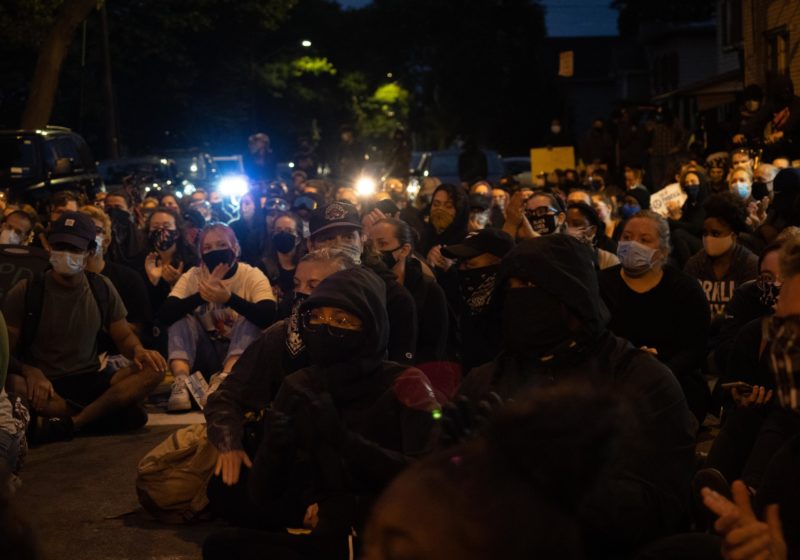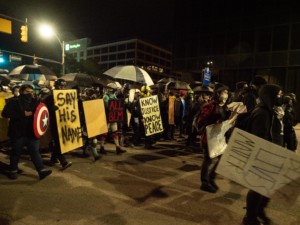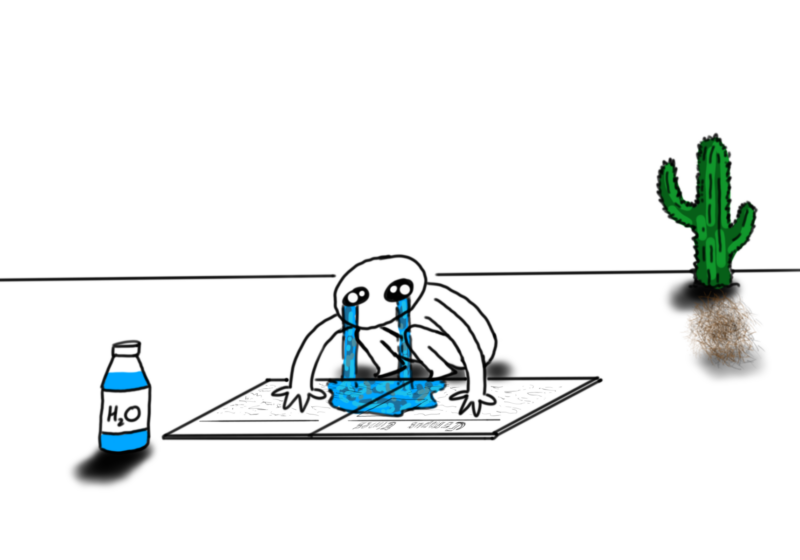George Floyd died in Minneapolis. Jacob Blake was shot in Kenosha. But Daniel Prude died here.
In your city, next to your University, on a street that starts near Riverview.
Whether or not you feel as though Rochester is your home, whether or not you’re here right now, most of us will be living here for the greater part of four years. Your presence, and the presence of the other students around you, has an undeniable impact on the city. We as students can’t singlehandedly end police brutality, but we can work to positively impact Rochester.
At Thursday night’s protest in response to the murder of Daniel Prude, only a few dozen students showed up, out of the thousands of overwhelmingly liberal students that attend UR. The next night saw larger numbers, but only a mere fraction of the students currently in Rochester — the same students who post endlessly on social media, who quickly condemn these tragedies in their social circles, who relish in their moral high grounds.
Of course, we recognize that some people don’t feel safe going to protests. Maybe they’re international students scared of the visa consequences of an arrest, or maybe they’re in a high risk demographic for COVID-19.
But that doesn’t mean that you can’t offer rides to people, or make signs, or provide PPE and donate to bail funds. That doesn’t mean you can’t vote, or call the local representatives to ask for the prosecution of the officers involved.
At the very least, take advantage of the education that’s offered to you. Attend some of the classes taught by faculty participating in the Scholar Strike happening this Tuesday and Wednesday. Go to events on campus like the 2020 Rochester Gentrification Conference happening on Sept. 19 in iZone. Take your social media activism into the real world, and do something more than talking to friends that agree with you.
And most importantly, hold our school to this same standard, too.
The University supports anti-racism in a host of performative ways: Wilson Day is one day out of a student’s four years here, and does little to foster real engagement with the community. The percentage of underrepresented minorities in UR faculty hovers around a disappointing 8 percent. And in the wake of racist incidents on campus, administrators announce community dialogues where many feelings and ideas are shared, but few are ever truly heard or put into place.
University administrators are quick to hit our inboxes with well-written vague statements of support in response to the many high-profile cases of police brutality toward Black people. These individual statements mean to assure students of color that their University cares about them and will support them. But their reactive nature contradicts that;
Despite UR’s supposed dedication to fighting systemic racism, the University has had a largely negative impact on the 19th Ward. President of the 19th Ward Community Association Zola Brown said in a Rochester City Newspaper article that there has been an influx of UR employees moving into the 19th Ward, partly due to home ownership grants provided by UR and the city of Rochester.
Additionally, many students move off campus to rent in the 19th Ward without contributing to the community in meaningful ways. This drives up prices and makes those neighborhoods unaffordable for former residents or people who would at least stay in the community longer than a couple years.
Who’s supposed to fix this? The students who need a place to stay, who cycle in and out of Rochester every four years, or the University which has been here for over a hundred years that touts their round table podcasts and diversity trainings as genuine activism?
As pointed out in this summer’s petitions, College Town used to be part of Rochester’s culture, but is now filled with overpriced restaurants that don’t remotely represent the needs of Rochester’s residents, and almost none of which are Black-owned or offer culturally Black foods, despite Rochester’s mostly Black population.
UR’s approved caterers list does not reflect the diversity of the city, meaning that UR has closed these opportunities to Black businesses. None of the on-campus vendors are Black-owned, yet California Rollin’, which responded to George Floyd’s murder with Facebook posts in support of the police, and, in turn, against Black people, remains on campus.
Among the biggest demands of last summer’s petition was to reverse past decisions to further arm DPS. In recent years, there has been a growing push by administration to arm Public Safety which seems frustratingly irreversible. Students are either entirely apathetic, or do not want this. No students are coming forward asking to arm Public Safety. Every effort to further arm officers has been done in the name of “safety.” But administration needs to admit that Black and Brown students feel less safe in the presence of armed officers. Just take a look at some of these testimonials by Black students at UR.
As it makes statements condemning the actions of the RPD, the University must recognize that DPS has its own history of racism, coupled with a track record of a deliberate lack of transparency and accountability.
Last semester, students called for Writing 105 courses to focus on topics that address identity and bias. Still, nothing has changed. The University has determined that learning how to write is essential but learning how to be anti-racist isn’t.
Of course, there are professors committed to teaching about and encouraging anti-racist activism. But a student’s knowledge on the topic shouldn’t depend on if they’re lucky enough to be paired with such a professor. An anti-racist curriculum should be standardized.
We’re just college kids writing for a school paper. Our impact is limited, especially when it’s only going to be seen by a few thousand people.
Part of our job as journalists is to document UR’s history. UR publications only discuss the good. It’s up to the Campus Times to cover the rest. It would be wrong for us to speak about anything else, when students got tear gassed by police during otherwise peaceful protests.
The best we can do is convince more students to take action, and look at ways that we can improve ourselves.
The Editorial Board is a weekly Opinions article representing the view of the Campus Times, co-written by Editor-in-Chief Hailie Higgins, Publisher An Nguyen, Managing Editor Corey Miller-Williams, Features Editor Micah Greenberg, and Opinions Editor Lucy Farnham.







